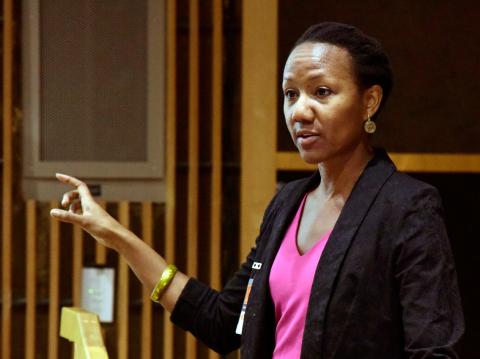Engagement
Duke’s Black Launches NIEHS Diversity Speaker Series

Photo: Steve McCaw
Dr. Sherilynn Black of Duke University launched the new NIEHS Diversity Speakers Series recently, sharing compelling results from her previous role as founding director of the Office of Biomedical Graduate Diversity at Duke’s School of Medicine. She described new approaches that her office pioneered to welcome a more diverse group of students to the school. She is now associate vice provost for faculty advancement at Duke.
“There has been an exponential increase in applications from underrepresented individuals since we started these new recruitment practices [in 2011],” Black said, adding that the number of underrepresented students who ultimately enroll and begin studies in the medical school has nearly doubled.
Efforts to correct disparities in the numbers of men and women in the sciences led to changes that have not yet extended to race, she explained. This is despite research that demonstrates diverse teams have greater success at problem-solving and innovation.
A 2008 book by Dr. Scott Page of the University of Michigan documented the science behind diversity.
“Progress depends as much on our collective differences as it does on our individual IQ scores,” he wrote in The Difference. Black pointed out that people too often think of diversity only as a moral imperative. “They don’t think about it as a scientific concept that is intellectually vital for us to advance as a society,” she said.
“We were so pleased to have someone of Sherilynn’s caliber and achievements to kick off the series,” said Dr. Ericka Reid, who directs NIEHS’s Office of Science Education and Diversity and chairs the series planning committee. “Her insights are relevant here at NIEHS, as well as in academia.”

Photo: Steve McCaw
Black established a comprehensive program that involved multiple offices and addressed the entire process—from applying, to success in the program after a student enrolled. “It’s not just going out to conferences and saying, ‘You should apply,’” she said. For example, partnering with other departments across the university is one key to success. “We could not have had the changes that we’ve had by involving only the School of Medicine,” said Black, listing student groups, administrative offices and others who contributed to the new programs. Her office also partners with academic institutions outside of Duke, numbering 18 so far.
“Engaging people from different levels and different areas of the educational experience helps students see that we take this seriously,” she said. “And it helps the departments to change the way they’re thinking about admissions.”
Once they arrive on campus, students from backgrounds that are traditionally underrepresented in the sciences continue to face challenges. Using a data-driven approach, Black’s office designed programs to help students overcome those challenges. Examples include social events, workshops on professional development and academic topics, support for qualifying exams and dissertations and an annual retreat for students.
The multifaceted approach is working. “Diversity is now a part of the scientific culture at Duke,” she quoted a faculty member as saying. In her new role focusing on faculty advancement, Black will tackle diversity among faculty, looking at success from the stage of postdoctoral positions all the way through tenure decisions.
